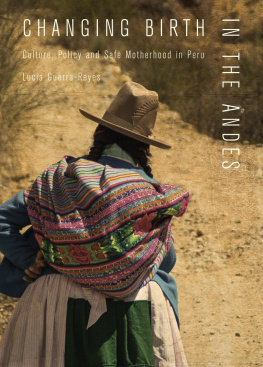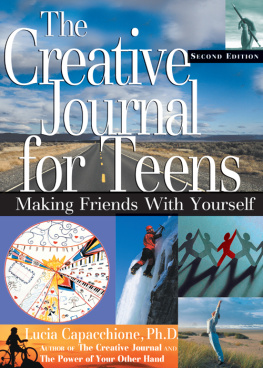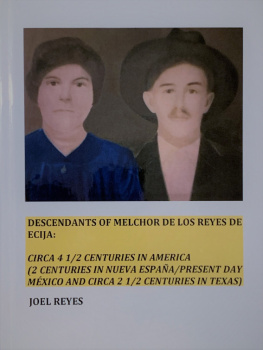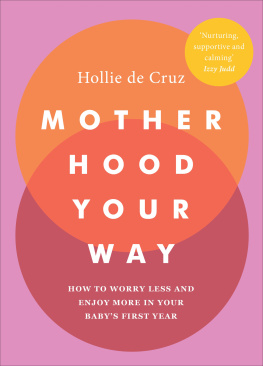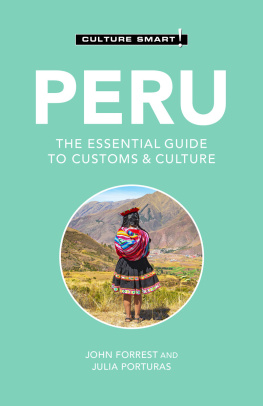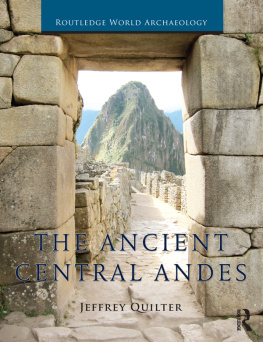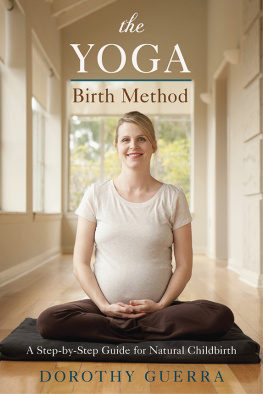CHANGING BIRTH IN THE ANDES
CHANGING BIRTH IN THE ANDES
Culture, Policy, and Safe Motherhood in Peru
Lucia Guerra-Reyes
VANDERBILT UNIVERSITY PRESS
NASHVILLE
2019 by Vanderbilt University Press
Nashville, Tennessee 37235
All rights reserved
First printing 2019
This book is printed on acid-free paper.
Manufactured in the United States of America
Library of Congress Cataloging-in-Publication Data
Names: Guerra-Reyes, Lucia, 1974-author.
Title: Changing birth in the Andes : culture, policy and safe motherhood in Peru / Lucia Guerra-Reyes.
Description: Nashville, Tennessee : Vanderbilt University Press, 2019. | Includes bibliographical references and index.
Identifiers: LCCN 2018039001| ISBN 9780826522368 (hardcover : alk. paper) | ISBN 9780826522375 (pbk. : alk. paper) | ISBN 9780826522382 (ebook)
Subjects: | MESH: Maternal Health Servicesorganization & administration | Parturition | Health Knowledge, Attitudes, Practice | Culture | Health Policy | Peru
Classification: LCC RG963.P4 | NLM WA 310 DP6 | DDC 362.198200985dc23 LC record available at https://lccn.loc.gov/2018039001
ISBN 978-0-8265-2236-8 (hardcover)
ISBN 978-0-8265-2237-5 (paperback)
ISBN 978-0-8265-2238-2 (ebook)
To Mateo, Adrian, and Daniel with love.
CONTENTS
FIGURES
ACKNOWLEDGMENTS
I am immensely thankful for the many people and institutions that contributed to this project over the years. First, I am deeply indebted to the women and men in Lima, Cajamarca, and Cusco: the mothers, fathers, policy officials, health providers, and community leaders who took time to share their experiences and stories with me. These exchanges illuminated the intricacies of desires, effects, and expectations of intercultural birthing in Peru. My profound gratitude to Maria Layme, mother, anthropologist, and Kantu research assistant, for all her work, for supporting me in speaking Quechua, and for welcoming the wakcha-me warmly into her home. I dedicate this book in her memory and that of other indigenous women who seek equitable and respectful health care.
Several institutions in the United States and Peru have been instrumental in bringing this book to fruition. At the University of Pittsburgh my graduate colleagues and mentors read and commented on the early pieces of what would become this book. I am especially grateful to Kathleen Musante, Joe Alter, Martha Terry, Harry Sanabria, and Patricia Documet, Amalia Pesantes, and Tyra Hudgens. The University of Pittsburgh Center for Latin American Studies funded formative research for this project. The Cultural Anthropology Program at the National Science Foundation provided doctoral dissertation funding (DDIG #0918030) for the yearlong research study that made this book possible.
At Indiana University I am lucky to work among inspiring colleagues who have supported and protected my time to allow me to finish this project. I owe special thanks to my chair, David Lohrmann, and to my senior colleagues in the Behavioral and Community Health curricular group. My special thanks to Virginia Vitzhun and Sara Phillips, who invited me to talk about this research in their anthropology classes, and to the students of Saras seminar class, who graciously provided comments on a very early version of the manuscript. Many thanks to the Office of the Vice-Provost for Research for providing grant-in-aid funding for the completion of this project.
I am immensely appreciative of the support of School of Public Health colleagues at the Universidad Peruana Cayetano Heredia. I would especially like to acknowledge Nancy Palomino, Ruth Iguiiz, Alejandro Llanos, Patricia Garca, Victor Cuba, and Esperanza Reyes for generously sharing contacts that made research possible, and for their inspiring work on improving sexual and reproductive health for all in our country. I owe immense gratitude to Jeanine Anderson from the Pontificia Universidad Catlica, who was instrumental in my education as a young field researcher and budding medical anthropologist.
I have been fortunate to benefit from various scholarly communities that have helped me think through the issues in this book. I was inspired by the work of senior researchers from the Council for Anthropology of Reproduction and by fellow panelists and discussants from the Society for Medical Anthropology, the American Anthropological Association, and the Society for Applied Anthropology. I am especially thankful to Trisha Netsch-Lpez for the long hours of ongoing discussions about birthing, interculturality in health, life, and anthropology. Many thanks to Trisha, Eliza Williamson, and Mounia El Kotni for their willingness to read and comment on parts of this book. Many thanks also to Naomi Byerley, who battled with rogue citations and formatting. I am immensely grateful to the wonderful women of the Scholarly Writing Program at Indiana University, and Laura Plummer especially, who were an amazing source of practical advice, writing inspiration, and emotional support during this process. My heartfelt thanks to Emma Young, who worked independently with me on language and editing and made this process much easier. Many thanks to Michael Ames, Beth Kressel Itkin, and the editorial staff at Vanderbilt University Press for their work on the various stages of making this book a reality. I also want to acknowledge the anonymous reviewers for their gracious and detailed comments.
My family has been the most incredible source of support in this long process. Jaime and Esperanza, my parents, cared for my children in Lima while I was in the field and supported me financially and emotionally at very difficult stages of the research. I am in awe of their love and commitment. I am humbled by Daniels unwavering love and encouragement. His support for this project and for my career kept me going through the extended fieldwork, family separation, and long hours of work. This book would not have been possible without him. Finally, Adrian and Mateo, as infants, were immensely important to this study; being their mother made me acutely attuned to the multiple meanings and shared desires for a good birth. Now, as funny and joyful big kids, they keep me grounded and hopeful.
GLOSSARY OF COMMONLY USED ACRONYMS
DIRESA: Direccin Regional de Salud or Regional Health Direction
ESSALUD: Social Security Health Insurance
IBP: Intercultural Birthing Policy
MDG: Millennium Development Goal
MOH: Ministry of Health
PAHO: Pan American Health Organization
SERUMS: Servicio Rural y Urbano Marginal de Salud or Rural and Urban Medical Service
SRHS: Sexual and Reproductive Health Strategy
UNFPA: United Nations Fund for Population Activities
UNICEF: United Nations International Childrens Emergency Fund
Introduction
Peru embraces vertical births to save lives.
Maria Luisa Palomino
The first time I heard about the Peruvian Intercultural Birthing Policy, I was floored. A policy that incorporated traditional Andean and Amazonian birth-care traditions into official clinical practices? This idea was groundbreaking and progressive. Implementing it would require a lot of effortretraining staff, redesigning delivery rooms, updating the protocols for months of prenatal care. This was no minor tweak. The piece that really struck me, however, was that this new policy indicated a sea change in the way the Peruvian Ministry of Health (MOH) viewed indigenous peoples. The overarching policy goal wasas is pretty normal for any birth-care policyto save lives by preventing death during delivery. Yet it encompassed so much more. In recognizing the desire for culturally respectful birth, the MOH was broadening its definition of success and thinking about indigenous women more holistically, as patients with rights. Indeed, the policy was officially touted as Perus great step forward to decreasing maternal deaths while providing culturally appropriate and compassionate birth for indigenous women (Andina 2008; Fraser 2008).

